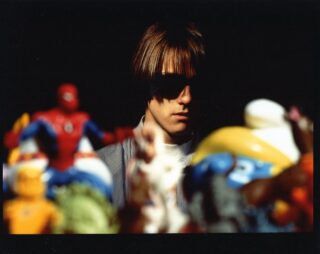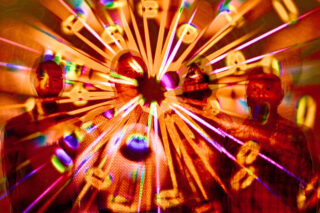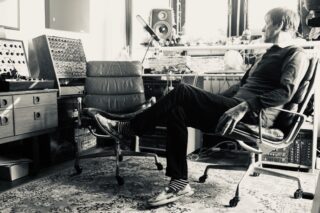Semi-invisible: LOOP, Spacemen 3, and UK psych’s hidden history
Before shoegaze and acid house, a dysfunctional wave of British guitar bands were pursuing a psychedelic horizon all of their own – and then it all imploded

Before shoegaze and acid house, a dysfunctional wave of British guitar bands were pursuing a psychedelic horizon all of their own – and then it all imploded
“I’ve always been very vocal about not liking scenes,” says Robert Hampson of LOOP. “I have a dislike of pigeonholing and sticking a label on something. I didn’t feel part of anything.” A day later Pete Kember of Spacemen 3 says that, “we felt we were a little bit out on our own,” before Terry Bickers from The House of Love informs me, “in terms of a scene, I wasn’t much of a mixer – so I’m not sure if I am particularly qualified for comment.”
And so goes my attempt to explore and theorise an interconnected community of like-minded, and underappreciated, bands from the late 1980s, who together formed an important part of a burgeoning new musical movement. On paper at least, it seems like something was sweeping across British guitar music in the late 1980s. Following on from the backcombed metallic screech of the Jesus and Mary Chain, the amorphous textural clouds of the Cocteau Twins, and supercharged by a common love of 1960s bands, was a distinct group of bands loosely operating under a psychedelic banner.
While in some of the jangly, indie-ish, psych-ish bands you could detect the sounds of sun-baked LA or the melodic flair of The Byrds or Love, many other groups were looking to something heavier, grittier and darker – effectively eschewing the paisley in favour of leather and sunglasses.
“Psychedelic is a big word,” says Kember, chatting from Portugal. “I don’t like whimsical psych. We were more just a druggy band with some songs that were very psychedelically inspired. I always felt bands like The Stooges and MC5 were psychedelic.” Kember also credits AIP Records’ iconic Pebbles compilation series as “an education in more gritty psych”, after a mate got knocked off his scooter and used his payout money on the expensive imports.
For Hampson, the sole remaining member of LOOP – who are set to release Sonancy, their first new album in 32 years, in March – bands like The Stooges, Suicide and The Velvet Underground were a vital lifeline. “We were drawn to those bands like moths to flames,” he recalls. “There weren’t really any other bands to go to.”
Be it hard droning, grinding psych, more melodic stuff, indie-pop or pure bluesy retro-rock, the late ’80s saw a little wellspring of bands tapping into this world. Alongside LOOP and Spacemen 3, XTC frontman Andy Partridge’s fictional outfit The Dukes of Stratosphere had a self-imposed rule that they must follow the conventions of 1967 and 1968 psychedelia; there was Jim Jones’ early band Thee Hypnotics, as well as The Telescopes, The Chemistry Set, and Dr. Phibes and the House of Wax Equations (whose lead singer was later jailed for murdering his own mother); further into the mainstream, several Creation Records groups, like Primal Scream and The House of Love, more than overlapped with this world.

Spacemen 3, formed by Kember and Jason Pierce (later of Spiritualized), were operating out of somewhere not exactly renowned for being a cultural hub: Rugby, in Warwickshire.
“Why Rugby?” Kember asks himself with a bemused chuckle. “I don’t know. But we always felt that we were better off developing in isolation than being in a big city and part of some scene.”
After Spacemen 3’s first ever show, a friend told Kember he’d “never been more insulted in [his] life.” Kember adds: “A typical Spaceman 3 live show left to our own devices – and I know this because I edited one recently – was as much silence as it was noise. We’d play songs and then sit smoking and talking. I guess we felt if the audience didn’t give a fuck we didn’t. We were sort of an anti-performing band. We sat down with our backs to the audience, no lights on stage, just projections, semi-invisible.”
This didn’t initially endear them to people. “They were very confident, but no one else cared,” remembers David E. Barker of Glass Records, who put out Spacemen 3. “The music press certainly didn’t. My distributor asked me if I was ‘sure about this one?’ There was no real buzz in the UK until later.”
It was soon advised that the sitting down to smoke and talk for prolonged periods of time on stage ought to stop. “Management were like: ‘What the fuck are you guys doing?’” Kember recalls with a laugh. “They were like: ‘Cut all the fucking gaps out.’ When we did, I think we probably were one of the best live bands around.” The band evolved significantly over a short space of time. The initial fuzzed-out drones, featuring covers of heroes like The Stooges and The 13th Floor Elevators, expanded and developed, as gospel influences coalesced with the hypnotic pulses, blistering one-chord churns and drugged-out grooves.
LOOP were also an incendiary live force around this time and were frequently rattling venues to their foundational core. “Volume was important,” Hampson says. “Much like Swans, when it gets above a certain level all those frequencies create a symphony. I wanted that all the time, even if there was only a small crowd. We ruined many PAs back in the day. Most venues had incredibly inadequate sound systems and we gained a reputation very early on for either having venues close down due to noise, or just breaking the PA. The odd person will still come up to me and tell me that LOOP were responsible for their partial hearing loss.”
So, if there wasn’t much in the way of a scene or community at the time, did this mean there was competition?
“I’ve never felt any rivalry,” says Stephen Lawrence of The Telescopes. “We were all going for sensory overload in our own way. As for a scene, it was much wider back then, not just psych music but the whole DIY and independent scene in general.”
But there was more tension between LOOP and Spacemen 3. “I thought it was a weak move to be clearly very influenced by us like that,” says Kember of LOOP. “Robert was the assistant at the record company [Glass] so this dude knew us from our demos on. But they were a cool band – and I’m sure we were also more than a little disappointed that we couldn’t even get run over by the press, [while] they had two of the three front covers (NME, Melody Maker and Sounds).”
Memories have perhaps become a little hazy over the decades here. LOOP were never on the cover of NME (nor Sounds as far as I can find), and when they did grace the cover of Melody Maker on 12 November 1988, they were followed a week later by Spacemen 3. For his part, Hampson passes on the subject entirely. “I wish to not comment on that,” he says. “I don’t get involved in playground squabbles, and I’m getting to be an old man now. I just don’t have any interest in it, sorry.”

While psychedelic music was once indelibly intertwined with hallucinogens – LSD in particular – with sprawling guitar lines unfurling in synchronicity with kaleidoscopic projections, by the 1980s, the British psych scene was less colourful and flowery, fuelled by paranoia-inducing bathtub speed as often as it was by prismatic acid.
“Spacemen 3 were a poly-drug band,” says Kember. “We weren’t just taking psychedelics, we were taking hypnotics, opiates, amphetamines – sometimes simultaneously.”
It was more of a backdrop than a driving force in LOOP’s world. “You don’t have to take drugs to make music,” Hampson says. “You don’t have to be on them to appreciate it. We took drugs, but it wasn’t the be-all and end-all. I probably would have taken them even if I was a dustman who listened to Kenny Rogers – which might be necessary if you have a thing for Kenny Rogers I guess. To be honest, I found all that really fucking boring.”
By 1988, numerous bands could be seen staring head down into a sea of pedals and creating squealing guitar feedback to hypnotise and obliterate audiences. But this was also the era of acid house. Despite their tonal differences, it’s not a stretch to draw similarities between the two: as well as sharing an emphasis on groove, repetition, immersion and drug use, both provided a mind-bending escape from the political backdrop of Thatcher’s Britain.
Was there much of a kinship between these worlds? Once again, Kember and Hampson look at things from completely different perspectives. “Yeah, for sure,” Kember says without hesitation. “It ticks a lot of similar boxes: minimalist repetition, often psychedelic, quite druggy. You couldn’t really not be influenced by it. Everyone I knew was, even people who had been punk kids. Everyone got into it on some level because it was this 3D experience because of MDMA being involved so heavily. It was an experience and interaction with music that people hadn’t had before.”
Hampson: “I hated [acid house]. The first thing that it did was destroy the live scene; there were very early curfews so promoters could cram a load of neds [a derogatory Scottish term, largely resigned to history, meaning Non-Educated Delinquents – equivalent to the similarly problematic ‘chav’] into the venue straight after and charge them £5 for a small bottle of water. The music did nothing for me. No drugs in the world would have got me into it. I can only think of one positive that came from it, and it was short-lived, but it stopped a lot of violence. Even the meatheads loved each other for a while… until the heavy drugs took hold.”

Despite the differences between bands like LOOP and Spacemen 3, one thing that feels irrefutable is their impact and influence on the immediate wave of shoegaze bands that followed. Kember remembers My Bloody Valentine supporting them in 1987, and then again a couple of months later, and seeing a dramatic shift.
“Kevin [Shields] has said that Spacemen 3 changed the way they were doing stuff,” Kember said in a 2013 Electronic Beats article. “I witnessed that change. It was as though they had just flipped into this new mode.”
He continues today: “There was a clear, night-and-day shift between something like ‘Sunny Sundae Smile’ and ‘You Made Me Realize’. It was a quantum leap. I think they liked the energy of what we were doing and the ascending solo in ‘You Made Me Realize’, where it goes up the neck fret-by-fret, was one of my things that I used to do. But they’d deliver it in a totally different way. The first time I heard it, I asked ‘Who wrote that song?’ and Kevin’s like, ‘I did’ and I was like ‘Come on, it’s a cover dude, that song is fucking ridiculous’. I mean, just, wow.”
Similarly, Hampson can see the blueprints they laid down. “I think I can say – hopefully without sounding arrogant – that our influence was there,” he says.
The irony of this ‘scene’, perhaps better understood as a loose network of disconnected, disagreeable contemporaries, is that for all its members’ reluctance to associate themselves with one another, they all pretty much petered out and died together, as if taking a final bow hand-in-hand. All the buzz, hype, momentum and interest that they had carried with them into the turn of the decade (typified by the Creation roster or Thee Hypnotics being the first ever UK act signed to iconic US indie Sub Pop) was soon pretty much brought to a halt. LOOP, Spacemen 3 and The Telescopes all stopped within about a year of each other.
LOOP had back-to-back number ones in the indie album charts, with 1990’s A Gilded Eternity even breaking the top 40 in the UK charts. Did it feel like they were on the brink of something really big?
“Oh, I don’t give a fuck about that,” says Hampson. “Never have and never will. That’s for critics to ponder on, I don’t care. I’ve never been one to make music to win prizes or bring untold riches. After A Gilded Eternity, I simply felt I wanted to go elsewhere and at that time it didn’t feel LOOP was part of that thought process. I don’t ever dwell on whether that was a mistake or not, it simply was how I felt and I’m a creature of instinct, I go with gut feelings. Always forward is my motto.”
Spacemen 3 quickly followed, with Kember and Pierce’s increasingly tense relationship – resulting in a final album split to half a record each – soon becoming untenable.
There are many pioneering and brilliant groups from this era who get overlooked, with AR Kane perhaps being the most tragic example. Yet to paint the likes of Spacemen 3 and LOOP as forgotten underground groups, flagrantly ignored in favour of paler imitators (MBV not included), is somewhat disingenuous. Their legacy has been notable: Robert Smith handpicked LOOP for his Meltdown Festival at the Southbank Centre, big fans Mogwai invited them to play ATP, then ATP asked LOOP to curate an entire festival; even more prominently, Spacemen 3 have been namechecked and mimicked endlessly, especially around the psych resurgence of the early 2010s.
“Looking in the rear-view mirror, it’s funny how birds of a feather flock together,” says Kember. “Sometimes when they don’t even realise they’re doing that. A lot of my favourite bands were a dysfunctional bunch of kids who got together to try and vent some of their angst. That’s what we were, basically.”
There’s something cyclical about the nature of all these projects, made up as they are of loops, repetition, pulses, and extended grooves. LOOP are back with an album that, fittingly, picks up where Hampson left off, grinding out ferocious, metallic, crunchy slabs of driving guitar noise. Meanwhile, Spacemen 3 have found themselves back in vogue. Their track, ‘Big City’, released exactly 30 years earlier, played out prominently in the superb but cringe-inducing episode of HBO TV series Succession in which Kendall Roy hosts his own birthday party. The same track has also featured on The Simpsons, and was recently covered by LCD Soundsystem during their Brooklyn Steel residency.
So with LOOP an active force in 2022, The Telescopes releasing a constant stream of records since reigniting in the early 2000s, and Thee Hypnotics having recently reformed, is there space for the return of Spacemen 3?
“People always have this ‘Oh, it’d be so awesome’ attitude,” says Kember. “Maybe it would, maybe it fucking wouldn’t. I mean, did you see the Velvet Underground?” Kember seems content with the legacy of the band as it is. “I’m touched. If someone would have told me way back then the way the band would be thought of over the years we would have just all laughed our heads off and said, ‘Whatever dude, you’re tripping harder than we are.’”